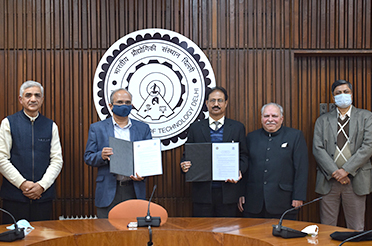Publish Date: 27th January 2021
IIT Delhi Researchers Propose Non-Leachable Antimicrobial Coating to Deal with Implant-Associated Infection
Share this on

Medical implants such as pacemakers, intra-ocular lens, heart valves, hip and knee implants medical catheters and other such implants come under the broad category of medical devices used for preventive, diagnostic or curative purposes in a medical condition. Implants are installed inside the body surgically and their prolonged usage often leads to infections that arise from the microbial biofilms that are formed on the implant's surface causing fatalities worldwide and added hospitalization costs.
The most common strategy to counter the problem of Implant-associated infections (IAI) is the use of high dose antibiotics. But with the evolution of antibiotic resistant microbes, this has proved ineffective in infection management. In fact, the continuous releasing of antibiotics from the implants actually creates the conditions for the generation of such antibiotic resistant strains of microbes. Another disadvantage of this strategy is the exhaustion of the antibiotic dose over a period of time due to leaching out.
A study by the research group led by Prof. Sampa Saha, Department of Materials Science and Engineering, has proposed a non-leachable antimicrobial coating as a measure to deal with the danger of infections related to implants. The study was published in a highly reputed journal, ‘Materials Science and Engineering C’.
The research team created a biodegradable 3D printed polymeric implant, which is modified with anti-infective polymer brushes. The implant itself is fabricated from a blend of completely biodegradable polyesters, i.e., polyester of tartaric acid - a natural acid found in tomatoes, grapes and raw mangoes and polylactic acid originated from corn starch.
Using the polyester as a scaffold, infection resistant polymer brushes are chemically bonded to its surface. The surface tethered brushes, fabricated from poly[(2-methacryloyloxyethyl] trimethyl ammonium chloride) (PMETA), are of nanometre dimensions, which possess antibacterial activity.
An evaluation of antibacterial activity and cytocompatibility revealed that the composition of the brush not only inhibits bacterial growth but also offers a stable, non-leaching, anti-infective, cytocompatible coating on the surface of the implant. Further, the brushes also offer a physical barrier to the microbial cells, discouraging their colonization on the surface of the medical implant for prolonged period of time.
The other research team members include Ms Shaifali, Department of Materials Science and Engineering, IIT Delhi; Prof Neetu Singh and Mr Akshay Joshi (Centre for Biomedical Engineering, IIT Delhi).








